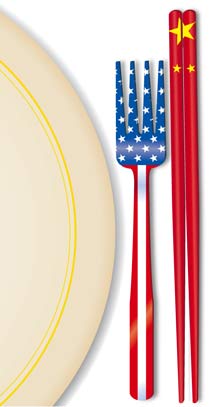
|
The value of having
a good business
partner in China
![]()

The solution is to use a chop fork, a utensil that combines the best features of both, able to cut meat and can be used like a chop stick.
Doing business in China requires finding the right partner. This Chinese partner must be bilingual, experienced in international business, have an excellent "guanxhi" network and loyal. In other words, you need to find a partner who is in a sense a chop fork.
No, all Chinese partners are not the same. Although, the answer is obvious, I have heard of many Americans who have entered into partnership or agency agreements with Chinese partners they do not know. It is funny how we in the US are particular about who we partner with and yet, when it comes to a foreign country, more specifically China, we let down our guard because a Chinese partner has been referred to us by a friend of a friend who has relatives from China 3 times removed.
» Isn't being bilingual over-rated and aren't all translators the same?
No, it will depend upon the role of the translator and how good the translator is. I have seen translators literally translate everything verbatim and offend the party receiving the translation. I have even seen translators cover up for the rudeness of the guest by translating the message so as not to offend the party receiving the translation. The latter is an example of a translator that is a keeper.
On the next level, you have a translator who not only can translate but can negotiate the project on behalf of the American partnership. A partner who can negotiate and translate is invaluable to the success of any business undertaking in China. This is also where the value of having a partner with international business experience helps.
With global trade making the world much smaller, it is not unusual to have a project involving a multitude of countries in one project.
» What is the value of having a business partner with an excellent "guanxhi" network?
As stated in Part 1, the value of "guanxhi" cannot be overstated. It is what makes China what it is. It is in the very fabric of everyday life in China. It is an accepted part of life and commerce.
A well connected business partner with "guanxhi" is also able to find new business opportunities for the partnership. Through his or her network, a really good partner can find someone who can provide a service or a product or government connections or even funding for a project or find someone who can advise how to interpret a government regulation in order to move the project forward.
Many Americans seeking opportunities in China will come across a roadblock which will seem insurmountable. The right Chinese partner can find a way to resolve this roadblock.
» Business is business, why is loyalty in a partner important?
The road to doing business in China is extremely difficult. There are moments of utter frustration at times because of cultural and business barriers.
There are also many less than desirable businessmen waiting for the over zealous American businessman to transfer his millions of dollars to a non-existing of a company or poorly run project.
The disloyal Chinese business partner will take the money and run or will run at the first sign of trouble and difficulty.
On the other hand, a loyal partner will hang in there with you and work even harder to make the project a success. This is where the true value of a loyal partner can be appreciated.
Bon appetit.
E-mail to Business Desk
[News] [Business] [Features] [Sports] [Editorial] [Do It Electric!]
[Classified Ads] [Search] [Subscribe] [Info] [Letter to Editor]
[Feedback]
